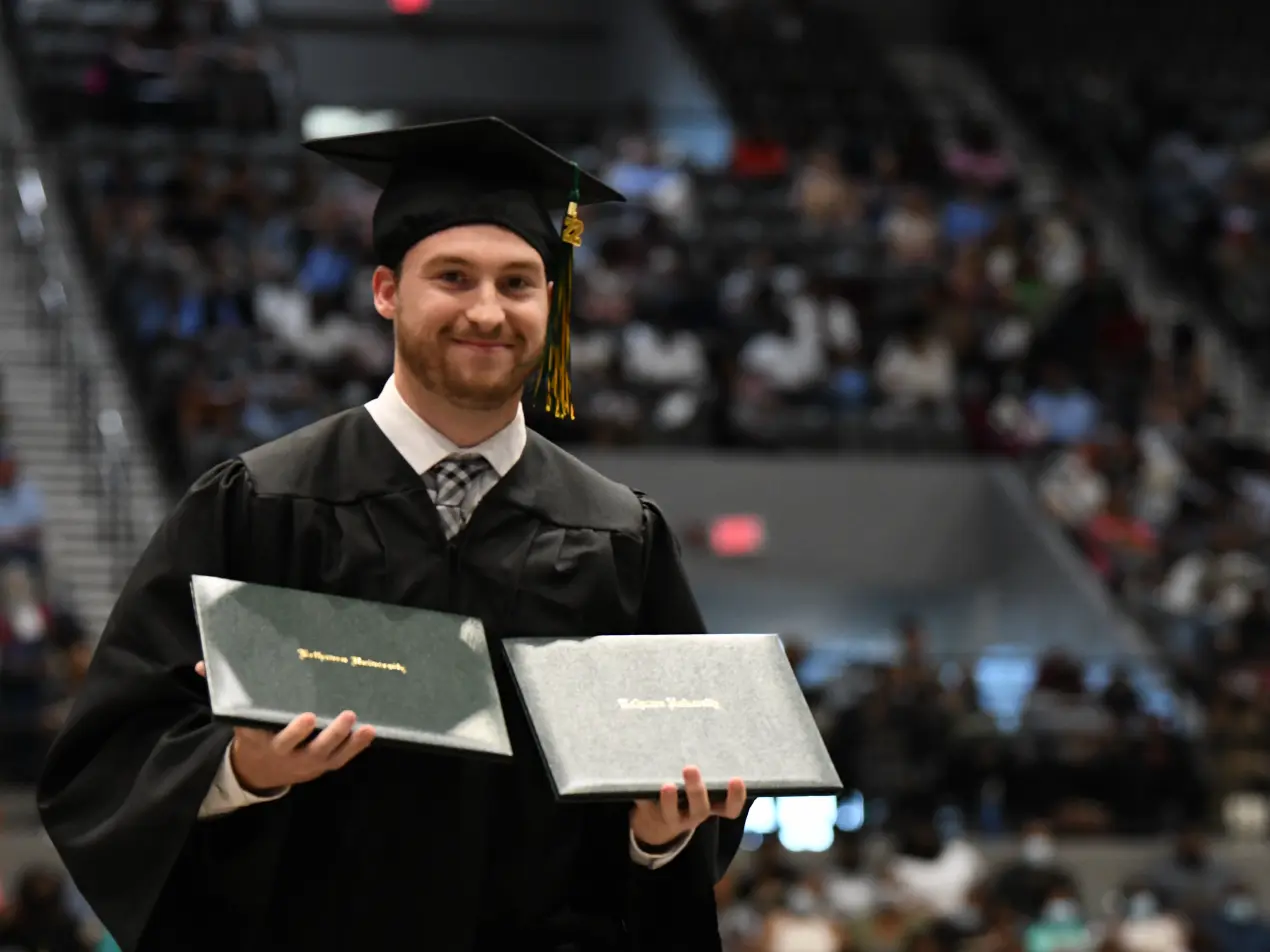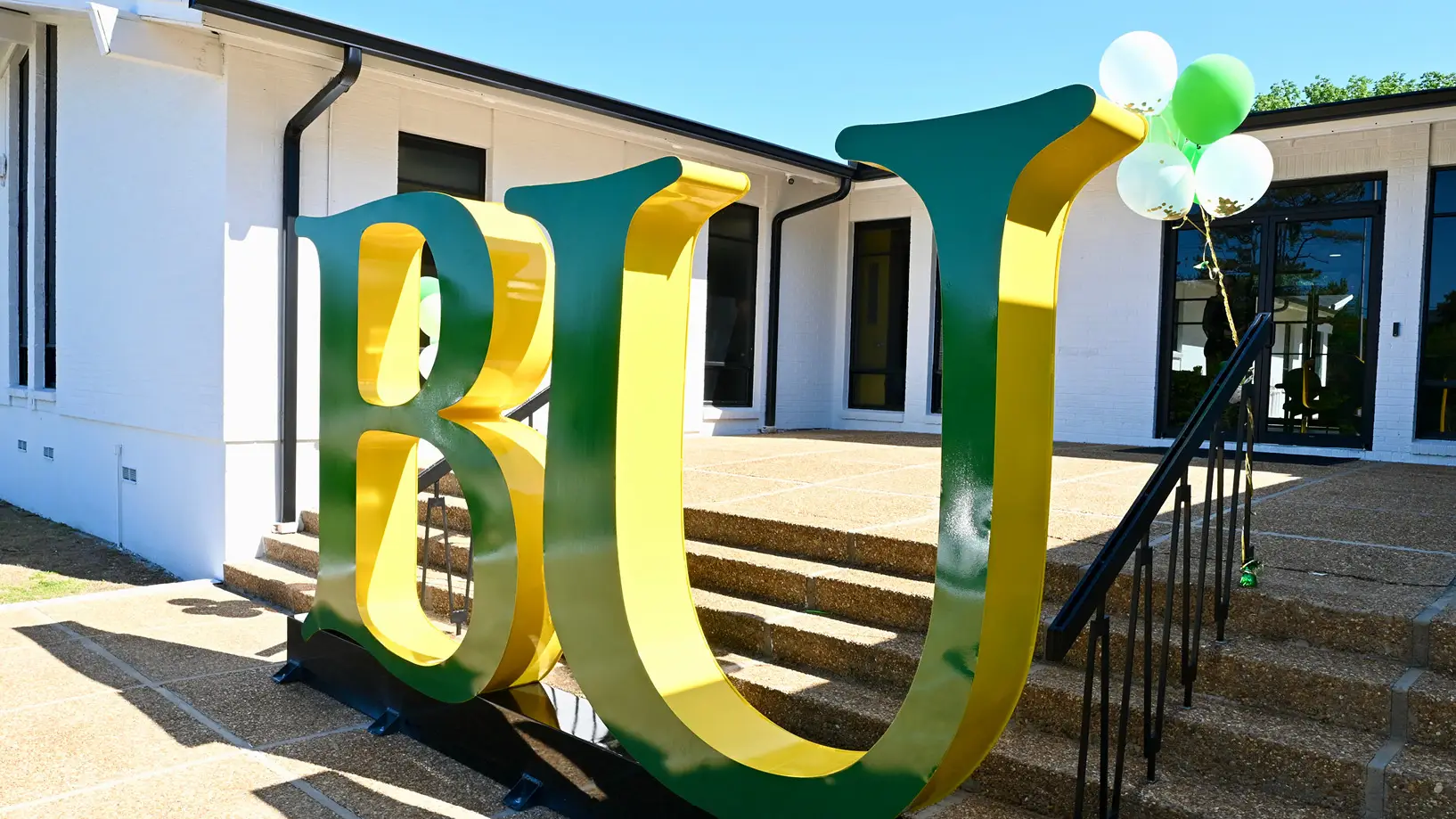Write Into Your Calling
Every writer’s first concern is his or her craft and creativity. Learn to cultivate the writing life as a high calling. Use your skills as a writer to explore and communicate the mysteries and meaning of creation and human experience.
Belhaven writers also develop practical skills and a clear career path for using their gifts. Your immersive experience includes internships, focused workshops, applied skills training, and experience editing and publishing The Brogue, our journal of fine arts.
Anything is possible for alumni of the Belhaven University Creative Writing program. Just ask bestselling author — and 2011 Creative Writing alumna — Angie Thomas, author of The Hate U Give, On the Come Up, and Concrete Rose. Angie got her start at Belhaven, and you, too, can benefit from our extraordinary faculty and thoughtfully designed curriculum.
Whether you major or minor in creative writing, you will find your skills sharpened, your worldview strengthened, and your calling clearer. Apply today to start your next chapter.
One of the Only Christian BFA in Creative Writing
Belhaven University is one of only three Christian universities in the U.S. offering a Bachelor of Fine Arts (BFA) in creative writing. Plus, our BFA program is one of the most storied and longest-serving writing programs in the country.

Creative Writing Major at Belhaven
Why You’ll Love Creative Writing at Belhaven
Unique Degree
At Belhaven, we have several unique and nationally-renowned arts programs. We’re one of only 43 universities in the world offering a BFA in Creative Writing, and we’re the only Christian institution on that list.
Publishing Opportunities
Get your work published in The Brogue, our journal of fine arts, or work with your professors to submit work to outside publications. We support these endeavors and empower you for success.
Caring & Expert Faculty
Your faculty members do much more than teach. They are active writers of fiction, poetry, creative nonfiction, book reviews, and scholarly publications. They are also caring mentors who want you to succeed.
Christian Worldview
You are challenged to think critically and analytically about who God is — and who you are — as we equip you to fulfill your calling to glorify God and be a blessing to the world.
Alumni
Working in diverse fields ranging from full-time writing, editing, publishing, copywriting to teaching.
Small Class Sizes
Get to know your professors and classmates through group workshops and discussions
Only
Christian university in the world offering a BFA in Creative Writing for more than two decades
What Can You Do with a Creative Writing Degree?
- Assist any organization that relies upon written communication
- Attend graduate school in creative writing, English, library science, publishing, and teaching English as a second language
- Edit for a publisher or journal
- Start your career as a writer
- Teach in public or private schools
- Work in public relations or graphic design
- Write copy for an advertising firm
- Write for newspapers or magazines, both online and print
What Skills Will I Develop?
- Well-developed creative and critical thinking abilities
- A broad understanding of creative writing in relation to historical and cultural contexts, especially the biblical worldview and the development of Western civilization and literature
- A mastery of the craft of writing in genres such as poetry, fiction, creative nonfiction, and scriptwriting
- Applied skills in areas such as editing, graphic design, marketing, teaching, and business
- A mastery of the tools of all good writing: from grammar, punctuation, and mechanics to voice, style, and originality
- A deep appreciation of the ways in which creative activities such as writing allow us to uncover the wonders of a world charged with meaning and hope, though marked by pain and loss
What Are Belhaven Grads Doing Now?
- The New York Times Bestselling Author: Angie Thomas (The Hate U Give and On the Come Up)
- Fulbright Scholar and Professor of English: Addie Leak, University of Jordan (Amman, Jordan)
- Publishing Assistant: Emily Polson, Simon and Schuster (New York City)
- Public Relations Specialist and Documentary Filmmaker: Sarah Christine Bolton (Children of the Wall)
- Book Production Editor: Nicole Hall, Mascot Books
- Marketing Coordinator: Kristine Weaver, University Press of Mississippi
- Teachers of English as a Second Language: Seraphine Lin and Minchun Park
- Advanced Communications Instructors for the Blind: Heather Rasmussen and Addie McBryde, Center for the Blind
- Librarian and Archivist: Rebecca Yantis
- Public Health Administrator: Catherine Karlak
- Advertising Copywriter: David Rahaim
- College Admission Counselor: Caitlin Dunn
- Elementary, Middle, and High School Teachers: Peter Davis, Jacob Rowan, and Sarah Duberowski
- College Professors: Rex Bradshaw, Lindsay Gill, and Adie Kleckner

A Celebrated Haven for Arts Education
Only 39 universities in the U.S. are accredited in all major arts. Belhaven is one. That means master classes, great performances, and national competitions. When you study art, dance, music, or theatre here, you’re earning a degree from a nationally recognized school for the arts.
Creative Writing: What You’ll Study
Bachelor of Fine Arts in Creative Writing

The Belhaven Advantage
Fuel your academic passions and expand your career options. Belhaven offers our freshmen a unique deal: double major, and we’ll pay the tuition if you need a fifth year in school. Double major in two arts programs, pair a business degree with a STEM major … the possibilities are endless!
Creative Writing: Admission & Financial Awards
Enrollment in the Creative Writing major or minor depends on your ACT score. A score of 22 or higher in reading is required. You also must submit a portfolio of your writing. This portfolio also completes the requirements to apply for the Angie Thomas Writers Scholarship.
If you have questions about the creative writing program, please call the department chair, Dr. Randy Smith, at 601-968-8996. You also can email questions to Dr. Smith at rsmith@belhaven.edu.
If you have questions about the scholarship or the application process, contact the Office of Admission at 1-800-960-5940 or admission@belhaven.edu.
If you don’t meet the admission criteria, you may apply for provisional admission. If you’re approved for such an admission status, you enter the program on academic probation, and your status will be reviewed after two semesters.
The Angie Thomas Writer’s Scholarship — named in honor of 2011 BFA alumna Angie Thomas, the bestselling author of The Hate U Give, On the Come Up, and Concrete Rose — was established in the fall of 2019. The award provides one freshman creative writing student with a four-year, full-ride scholarship (including tuition, room, and board). Other applicants may receive smaller awards and the designation of Angie Thomas Scholars.
To qualify, you must be accepted for admission, submit your high school GPA and test scores, complete your FAFSA and submit the portfolio requirements.
For scholarship questions, talk with your admission officer or contact the Office of Admission at 601-968-5940 or admission@belhaven.edu.
We are excited that you are interested in pursuing your desire to major in creative writing at Belhaven University. At Belhaven, we place a very high value in providing the highest quality fine arts programs.
The foundation of your financial aid award will be your academic scholarship, which is determined by your GPA and ACT score. After your portfolio review, you may be eligible for additional aid based on your performance level and family financial need.
Here are the specific steps you need to follow:
- Apply to Belhaven so that we can begin the process for you to be accepted to the University.
- Submit/report your high school GPA and either your ACT, SAT, or CLT test scores. Based on this information, we will offer you an academic scholarship that recognizes your academic achievement.
- Plan a campus visit to have your portfolio reviewed with one of our creative writing professors. Your portfolio will be taken into consideration as we complete your final scholarship award package.
- Complete the Free Application for Federal Student Aid or FAFSA (available January 1). The FAFSA will let us know what amount of federal assistance OR Belhaven need based assistance you would be eligible to receive. No matter what you think your family might qualify for from the federal government, we STRONGLY encourage you to complete the FAFSA as Belhaven's grants are typically more generous than the government might indicate you could receive.
- After we have all your information (academic record, portfolio, and FAFSA) you will receive a comprehensive financial aid package that is influenced by all three of these areas.
- Please contact the admission office at 1-800-960-5940 or admission@belhaven.edu to learn more or to meet with an admission counselor.
Creative Writing: Student Opportunities
Each year, we visit multiple writing conferences and festivals, allowing you to meet and network with professional writers and other students. These events are also an opportunity for you to learn about the latest developments — and career options — in writing and publishing.
We invite two writers to join our faculty as visiting mentors and teachers every year. They help guide your work and your writing philosophy, encouraging you to grow in your craft and creativity.
Our journal of fine arts, The Brogue, is published by the Creative Writing Department. You can submit original work and serve on the editorial staff.
“The Brogue represents our annual presentation of the best of student writing, art, drama, photography and graphic design at Belhaven,” said Dr. Randall Smith, Chair of the Creative Writing Department.
Practice your craft in writing workshops in short fiction, long fiction, speculative fiction, creative nonfiction, poetry, writing for children and young adults, scriptwriting, screenwriting, and playwriting.
As you develop your skills and understand your calling, you may want to do extended work in a particular genre—fantasy, literary nonfiction, children’s literature, long poems, or more. Look for the Special Topics Workshop.
What is the special topic? It varies each time we offer the workshop, so check with your advisor. And, come prepared to write, to share your work, and to contribute—no auditing allowed.
As a skilled communicator, you have many career options. Part of the Belhaven BFA in Creative Writing involves taking courses in one or more applied areas: business, communications, education, graphic design, or film.
Follow your calling and develop the career to match at Belhaven.
Creative Writing News
Contact Us
Office of Admission
Phone: 601-968-5940Mailing Address:
1500 Peachtree Street, Box 153
Jackson, MS 39202
For campus visit:
Jimmy Hood Welcome Center
855 Riverside Drive
Jackson, MS 39202
Fax: 601-300-2932

Verse of the Year
Go and make disciples of all the nations ... And be sure of this: I am with you always, even to the end of the age.
Matthew 28:19-20

